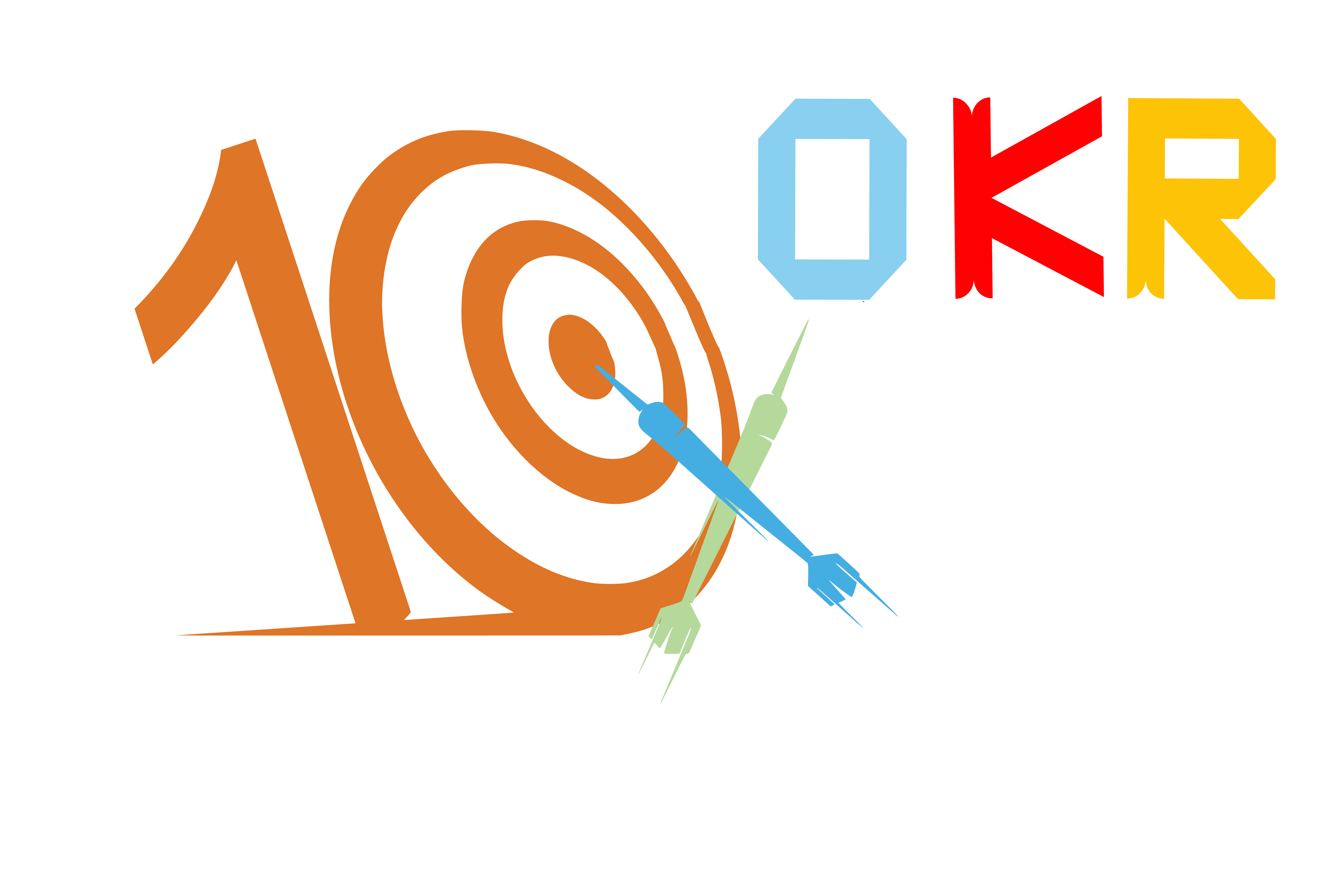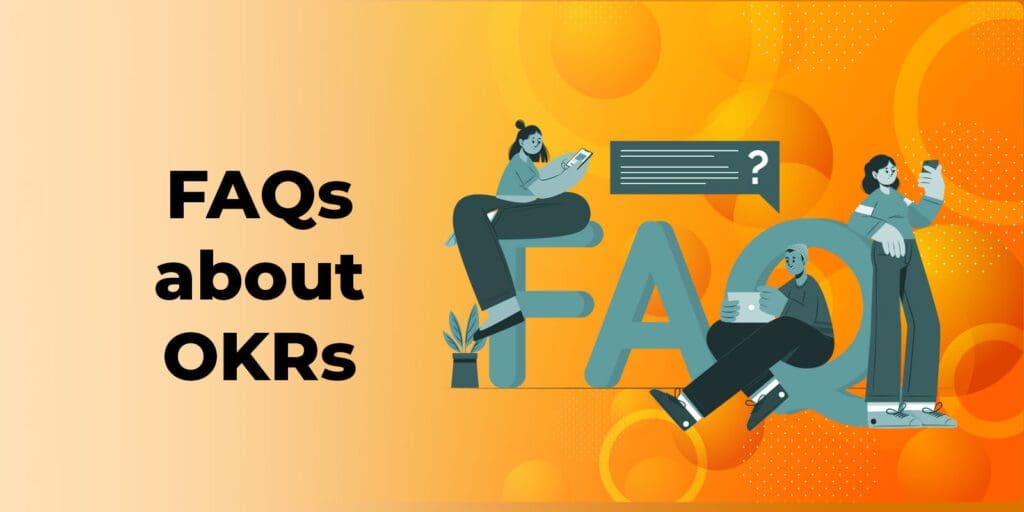Table of Contents
Are you curious about OKRs (Objectives and Key Results) and how they can transform your business? Look no further! In this comprehensive guide, we’ll answer all your burning FAQs about OKRs and help you understand how they can supercharge your organization’s growth.
12 Powerful FAQs About OKRs That Propel Your Goals Forward
Q1. What are OKRs and how are they related to business goals and company strategy?
OKR stands for Objectives and Key Results. When a company is looking to set goals for growth and development, it can rely on the OKR process. It is an achievement-oriented execution framework created to align and measure progress toward a company’s and individual’s goals.
As a simple and efficient management framework, it aligns employees with the company strategy. OKRs provide a way to convert broad and far-reaching business goals into specific and quantifiable objectives, as well as measurable key results. This makes it feasible to implement the company strategy at all levels of the organization, including the department, individual, and operational levels.
Q2. What is the history of OKRs?
The concept of OKRs was first introduced by Andy Grove, and it involves pairing specific objectives with measurable, time-bound key results to track company progress. As a CEO at Intel, Andy Grove borrowed the idea of MBO from Peter Drucker in the 1970s.
He then upgraded it with the concept of Key Results. Thus, OKRs were born, making Andy Grove the father of the OKR framework. They were later published by Google, which adopted the execution-oriented framework successfully in the late 1990s. Since, then, industries, both large and small have been implementing OKRs.
Q3. Can OKRs be used for performance evaluations?
OKRs can be used for assessing an employee’s performance by setting specific objectives and ensuring that the employee strives toward progress. While this can measure how well an employee is performing, it cannot become a substitute for performance evaluations.
Evaluation of performance revolves around an individual or team’s achievements over a certain period, potentially comprising input from others. OKRs aid in setting SMART goals that are compatible with the company’s overall OKRs; however, performance evaluations are more about measuring how effectively an individual is performing in their position.


Q4. Why are OKRs so effective?
Every business needs to have a clear sense of direction as to where it is going, what its goals are, and how it plans to achieve them. The OKR framework is a tool that helps businesses achieve these and more.
This goal-setting framework also ensures that the task of measuring progress is not the burden of a singular employee. Teamwork, commitment, and good intentions for the business lie at the heart of this tool. OKRs also create a culture of accountability, where employees are responsible for fulfilling their objectives.
Q5. What are the benefits of OKRs for business?
OKRs not only set ambitious goals for a business, but they also ensure the objectives within them are followed through. They increase accountability, improve performance, motivate team members, and increase overall employee engagement.
This framework provides room for continuous improvement which is necessary for the ever-changing competitive industry, thus helping businesses thrive in the long run. Employees also feel valued, seen and more aligned with the company’s transparent objectives.
Q6. What mistakes should a company avoid when setting up the OKR framework?
Some of the oversights that can happen include setting too many objectives, setting only top-down objectives, using vague language when setting the objectives, and so on.
Moreover, sometimes, companies don’t provide adequate resources to achieve the said objectives or fail to assign a DRI (directly responsible individual) to achieve the same.
Q7. Can OKRs be used in Public Sectors or Not-For-Profit Companies?
Yes, OKRs can be used in public sectors and not-for-profit companies. The advantage of this methodology is that it can be applied to any organization that has clear objectives and wants to enhance its performance.
OKRs can result in significant benefits for the public sector and non-profit organizations. These organizations can transform and make remarkable, trackable progress. By adopting OKRs, ruling parties and administrations enhance public health and well-being.
They can tackle social issues such as corruption, climate change, destitution, and gender equality, among others, by utilising OKRs. After establishing clear objectives and key results, they survey their progress and exhibit their achievements to stakeholders. This, in turn, can prove transparency and aid in effective resource allocation.
Q8. How do companies ensure that all the employees follow the objectives of an OKR?
The first step is to create awareness and ensure transparency. Companies ensure OKR adherence through clear communication, regular check-ins, ownership assignment, tracking tools, and a culture of accountability.
Q9. How will OKRs benefit a remote company?
OKRs benefit remote companies by providing clear goal alignment, transparent progress tracking, and accountability, fostering a results-driven culture that keeps remote teams focused and engaged.
Q10. Should startups use the OKR system?
Yes, startups can benefit from using the OKR system as it provides a structured approach to goal setting, alignment, and tracking, helping them prioritize tasks, focus on growth, and adapt to changes effectively.
John Doerr, in his book Measure What Matters, explains that in smaller start-ups, where people clearly need to be “pulling in the same direction, OKRs are a survival tool.” In the tech sector, companies must grow quickly by employing the OKR strategy to get funding before their capital runs dry.
For startups where the company culture is yet to be defined, OKRs help build it and also bring the team together for executing strategies and crushing their goals.
Q11. Can OKRs be used for individual goal setting or are they only for team goals?
OKRs can help both individuals and teams achieve their goals. In fact, many companies employ the framework at both levels to ensure maximum progress and goal achievement.
Creating SMART goals within the OKR system is especially beneficial for teams since all the members will contribute towards the goals.
Q12. What is the difference between OKRs and KPIs?
The main difference between OKRs and KPIs is that OKRs focus on setting and attaining specific objectives, while KPIs measure performance against specific metrics.
The former is used for planning and goal setting while KPIs are used for ongoing performance tracking. OKRs are usually more flexible and adaptable, however, KPIs, on the other hand, are often more fixed and focused on measuring progress towards predetermined metrics.
To Sum it Up
Learning about OKRs can really help improve how businesses set and reach their goals. By answering common FAQs about OKRs, we’ve seen how OKRs make things clear, help teams work together, and keep everyone accountable. Whether a big company or a new startup, using OKRs can lead to success by guiding everyone towards their goals and encouraging teamwork and success.



